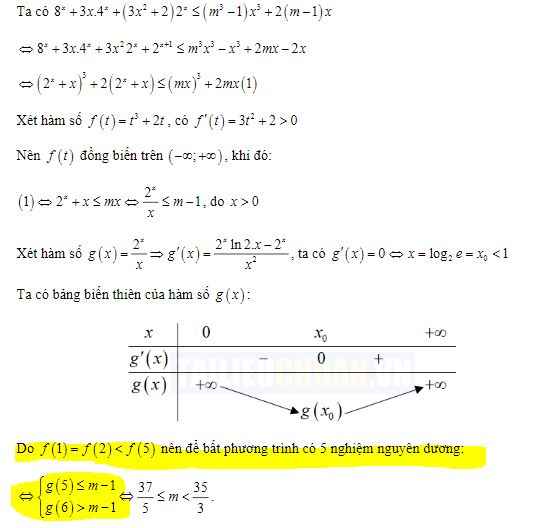
Hãy nhập câu hỏi của bạn vào đây, nếu là tài khoản VIP, bạn sẽ được ưu tiên trả lời.


a. Vì \(0< 0,1< 1\) nên bất phương trình đã cho
\(\Leftrightarrow0< x^2+x-2< x+3\)
\(\Leftrightarrow\left\{{}\begin{matrix}x^2+x-2>0\\x^2-5< 0\end{matrix}\right.\)
\(\Leftrightarrow\left\{{}\begin{matrix}\left[{}\begin{matrix}x< -2\\x>1\end{matrix}\right.\\-\sqrt{5}< x< \sqrt{5}\end{matrix}\right.\)
\(\Leftrightarrow\left\{{}\begin{matrix}-\sqrt{5}< x< -2\\1< x< \sqrt{5}\end{matrix}\right.\)
Vậy tập nghiệm của bất phương trình là \(S=\left\{-\sqrt{5};-2\right\}\) và \(\left\{1;\sqrt{5}\right\}\)
b. Điều kiện \(\left\{{}\begin{matrix}2-x>0\\x^2-6x+5>0\end{matrix}\right.\)
Ta có:
\(log_{\dfrac{1}{3}}\left(x^2-6x+5\right)+2log^3\left(2-x\right)\ge0\)
\(\Leftrightarrow log_{\dfrac{1}{3}}\left(x^2-6x+5\right)\ge log_{\dfrac{1}{3}}\left(2-x\right)^2\)
\(\Leftrightarrow x^2-6x+5\le\left(2-x\right)^2\)
\(\Leftrightarrow2x-1\ge0\)
Bất phương trình tương đương với:
\(\left\{{}\begin{matrix}x^2-6x+5>0\\2-x>0\\2x-1\ge0\end{matrix}\right.\) \(\Leftrightarrow\left\{{}\begin{matrix}\left[{}\begin{matrix}x< 1\\x>5\end{matrix}\right.\\x< 2\\x\ge\dfrac{1}{2}\end{matrix}\right.\)
\(\Leftrightarrow\dfrac{1}{2}\le x< 1\)
Vậy tập nghiệm của bất phương trình là: \(\left(\dfrac{1}{2};1\right)\)

Đặt :
\(t=\sqrt{x^2-5x+5}\left(t\ge0\right)\)
Bất phương trình trở thành :
\(\log_2\left(t+1\right)+\log_3\left(t^2+2\right)\le2\)
Xét \(f\left(t\right)=\log_2\left(t+1\right)+\log_3\left(t^2+2\right)\) trên \(\left(0;+\infty\right)\)
Do \(t\ge0\) nên \(\log_2\left(t+1\right)\) và \(\log_3\left(t^2+2\right)\) đều là các hàm số đồng biến, do đó f(t) đồng biến trên \(\left(0;+\infty\right)\)
Lại có f(1)=2, từ đó suy ra \(t\le1\)Giải ra được :\(1\le x\)\(\le\frac{5-\sqrt{5}}{2}\) hoặc \(\frac{5-\sqrt{5}}{2}\le x\) \(\le4\)
Nhận xét rằng \(\sqrt{5}-2=\left(\sqrt{5}-2\right)^{-1}\)
Do đó bất phương trình có thể viết thành :
\(\left(\sqrt{5}-2\right)^{x+1}\ge\left[\left(\left(\sqrt{5}-2\right)^{-1}\right)\right]^{x-3}=\left(\left(\sqrt{5}-2\right)^{3-x}\right)\)
\(\Leftrightarrow x+1\ge3-x\)
\(\Leftrightarrow x\ge1\)
Vậy tập nghiệm của phương trình là :
\(D\left(1;+\infty\right)\)

Đặt \(f\left(x\right)=\left(\frac{1}{6}\right)^x+2\left(\frac{1}{3}\right)^x+3\left(\frac{1}{2}\right)^x\)
Nhận thấy f(2) = 1. Mặt khác f(x) là tổng của các hàm số nghịch biến trên R. Do đó f(x) cũng là hàm nghịch biến. Từ đó ta có :
\(f\left(x\right)<1=f\left(2\right)\Leftrightarrow x>2\)
Vậy tập nghiệm của bất phương trình là
\(D=\left(2;+\infty\right)\)

Ta chú ý : \(x^2+x+1>0\) Logarit cơ số 10 hai vế ta có :
\(xlg\left(x^2+x+1\right)<0\)\(\Leftrightarrow\begin{cases}\begin{cases}x>0\\lg\left(x^2+x+1\right)<0\end{cases}\\\begin{cases}x<0\\lg\left(x^2+x+1\right)>0\end{cases}\end{cases}\)
Hệ thứ nhất vô nghiệm
Hệ thứ hai cho ta nghiệm x<-1

\(\log_{\frac{1}{2}}\left(4^x+4\right)\ge\log_{\frac{1}{2}}\left(2^{x+1}-3\right)-\log_22^x\)
\(\Leftrightarrow\log_{\frac{1}{2}}\left(4^x+4\right)\ge\log_{\frac{1}{2}}\left(2^{x+1}-3\right)+\log_{\frac{1}{2}}2^x\)
\(\Leftrightarrow\log_{\frac{1}{2}}\left(4^x+4\right)\ge\log_{\frac{1}{2}}\left(2^{2x+1}-3^x\right)\)
\(\Leftrightarrow4^x+4\le2^{2x+1}-3.2^x\)
\(\Leftrightarrow4^x-3.2^x-4\ge0\)
\(\Leftrightarrow\begin{cases}2^x\le-1\left(L\right)\\2^x\ge4\end{cases}\)\(\Leftrightarrow x\ge2\)
Vậy bất phương trình có tập nghiệm \(S=\left(2;+\infty\right)\)

Điều kiện \(x^2-1>0\Leftrightarrow\left|x\right|>1\)
Bất phương trình tương đương với :
\(\log_3\log_{\frac{1}{2}}\left(x^2-1\right)<\log_3\Leftrightarrow0<\log_{\frac{1}{2}}\left(x^2-1\right)<3\)
\(\Leftrightarrow\log_{\frac{1}{2}}1<\log_{\frac{1}{2}}\left(x^2-1\right)<\log_{\frac{1}{2}}\frac{1}{8}\Leftrightarrow1>x^2-1>\frac{1}{8}\)
\(\Leftrightarrow2>x^2>\frac{9}{8}\)
\(\Leftrightarrow\sqrt{2}>\left|x\right|>\frac{3}{2\sqrt{2}}\) (Thỏa mãn)
Vậy tập nghiệm của bất phương trình là \(D=\left(-\sqrt{2};\frac{-3}{2\sqrt{2}}\right)\cup\left(\frac{3}{2\sqrt{2}};\sqrt{2}\right)\)

Ta có điều kiện của bất phương trình là
\(x^2+2x-8>0\)
Khi đó ta có thể viết bất phương trình dưới dạng :
\(\log_{\frac{1}{2}}\left(x^2+2x-8\right)\ge\log_{\frac{1}{2}}16\)
Vì cơ số \(\frac{1}{2}\) nhỏ hơn 1 nên bất phương trình trên tương đương với hệ
\(\begin{cases}x^2+2x-8>0\\x^2+2x-8\le16\end{cases}\) \(\Leftrightarrow\begin{cases}x<-4Vx>2\\-6\le x\le4\end{cases}\)\(-6\le\)x\(\le-4\) và 2<x\(\le4\)
Vậy tập nghiệm của bất phương trình đã cho là
\(D=\left(-6;4\right)\cup\left(2;4\right)\)
